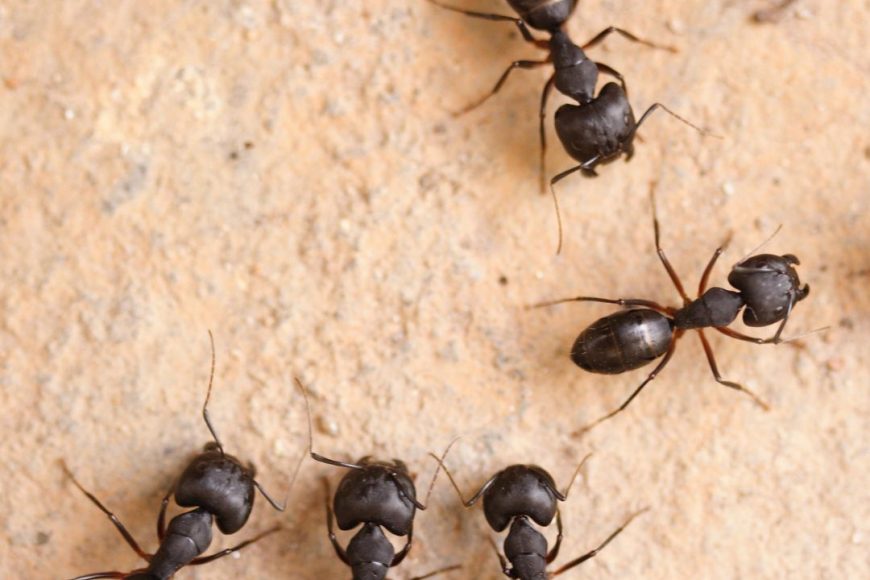Fill out the form below and a Cypress Creek representative will be in touch with you about your pest control needs.
BLOG

Common Ant Species in the Houston Area
Ants are among the most common household pests in Houston. With the region’s warm climate and high humidity, it’s no surprise that these tiny invaders thrive here year-round. But not all ants are the same—in fact, there’s a wide variety of species in Houston, each with unique behaviors, habitats, and, yes, challenges for homeowners.
This guide will introduce you to the most common ant species in the Houston area, their distinguishing characteristics, and tips on how to keep them out of your home. Whether you’re seeing a trail of troublemakers in the kitchen or spotting them in the yard, understanding who you’re dealing with is the first step in effective pest control.
Why You Should Know Your Ants
Ant infestations may seem harmless at first, but ignoring them can lead to significant consequences. Some ants contaminate food; others cause structural damage. Knowing the type of ants invading your space helps determine the best control methods and, most importantly, prevents the infestation from recurring.
Now, let’s break down the most common offenders in Houston.
Meet Houston’s Most Common Ants
1. Rover Ants
Rover ants are tiny, dark ants often mistaken for sugar ants. Though small (just 1.6 to 2 mm), they’re persistent, especially in humid environments like kitchens and bathrooms. Rover ants are attracted to sweet liquids and rarely bite, making them more of a nuisance than a threat.
Control Tip: Keep surfaces free of sugary residue, seal food containers tightly, and repair any leaky pipes to reduce moisture.
2. Ghost Ants
Ghost ants are aptly named because of their pale, nearly translucent color, which makes them hard to see. They’re small and quick to establish trails indoors, especially in search of sweet or greasy foods.
Control Tip: Seal entry points around windows and doors with caulk and promptly clean up spills or crumbs to avoid attracting them.
3. Crazy Ants
These ants earned their name due to their erratic movement. Commonly found outdoors, they migrate indoors during heavy rains. Crazy ants are highly adaptable and can survive in diverse environments, often displacing other ant species.
Control Tip: Trim plants and trees that touch your home to reduce their pathways indoors. Consider professional pest control for larger infestations.
4. Argentine Ants
Argentine ants are a significant threat because of their sheer numbers. They form massive colonies and often displace native ant species. These ants are dark brown or black and prefer sweet foods, though they’re not picky.
Control Tip: Use bait traps to target the colony directly, as sprays may only scatter them further.
5. Pyramid Ants
Pyramid ants are most noticeable outdoors, where their nests create small mounds in sandy soil. They are non-aggressive and rarely enter homes but can become problematic if left uncontrolled in yards.
Control Tip: Maintain a tidy yard and consider a liquid or granular insecticide to manage colonies before they expand.
6. Acrobat Ants
Acrobat ants are known for their heart-shaped abdomens. While they prefer to inhabit moist wood, they can also nest inside homes, especially where there is water damage.
Control Tip: Check for and repair structural damage caused by leaks or moisture buildup.
7. Bigheaded Ants
These ants are easy to identify thanks to their disproportionate head size. They burrow in soil and are often found in lawns or between pavement cracks.
Control Tip: Use soil treatments around your home’s exterior to stop them from entering.
Effective Ant Control Methods
Ant control isn’t always as simple as setting a few traps and waiting for results. To succeed, you need a comprehensive strategy:
1. Identify the Ant Species
Different species call for different control methods. For instance, baits are highly effective against sweet-loving ants but may not work for those attracted to grease.
2. Eliminate Food and Water Sources
Ants are resource-driven creatures. Eliminating easy access to food and water in your home removes what attracts them in the first place.
3. Seal Entry Points
Inspect your home for cracks, gaps, and other entryways where ants might invade. Use caulk, weather stripping, or door sweeps to act as barriers.
4. Use Ant Baits
Bait traps are popular for targeting entire colonies. Make sure to place baits along active trails and avoid using sprays near bait traps, as this may deter ants from taking the bait.
5. Call a Professional
Some ant issues are too extensive for DIY solutions. A professional pest control service, like Cypress Creek Pest Control, can identify and treat specific infestations effectively using advanced methods.
Why Trust Cypress Creek Pest Control?
With over 50 years of experience serving Houston homeowners, Cypress Creek Pest Control has seen it all. Whether you’re dealing with a few rogue ants or a full-blown infestation, our team offers tailored solutions to fit your needs. From residential to commercial services, we’ve helped over 12,000 clients eliminate pests while protecting their properties.
Final Thoughts on Ant Control in Houston
Ant problems, while common, don’t have to take over your home. The key is identifying the species you’re dealing with and taking targeted action to eliminate them. While DIY methods can work for small issues, professional help ensures long-term control and peace of mind.
If you’re struggling to control ants or other pests in the Houston area, contact Cypress Creek Pest Control today for a free estimate.

